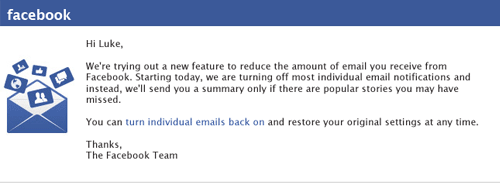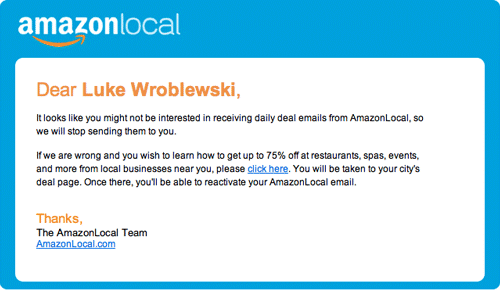People spend a lot of time in their email Inboxes. So it's not surprising that email notifications are an ongoing source for engagement for many Web companies -in many cases a crucial one. But it is surprising when companies do the right thing for your Inbox and automatically stop sending irrelevant emails.
I recently got two notifications telling me I'll be getting less email from Web companies. The first came from Facebook, who was arguably built on the back of email notifications. Facebook informed me (via email of course) that:

"We're trying out a new feature to reduce the amount of email you receive from Facebook. Starting today, we are turning off most individual email notifications and instead, we'll send you a summary only if there are popular stories you may have missed."
I'm assuming not everyone on Facebook got this note. For Facebook users that visit the site infrequently or get few notifications, email might remain the best way to pull them back in to the site. If someone has lots of activity/frequent visits, email can become duplicative and ultimately annoying. Not sure if I fell into this camp but since email notifications stopped coming, I know I have visited Facebook a lot less.
My second notification came from Amazon and said:

"It looks like you might not be interested in receiving daily deal emails from AmazonLocal, so we will stop sending them to you. If we are wrong... please click here."
In this case, Amazon was tracking my click-through on their daily email emails, noticed I never engaged and decided to stop spamming me. Imagine if Groupon, LivingSocial, and all the other daily deal sites out there took a similar customer-centric stance. Highly unlikely.
Turning off email notifications is one design approach for reducing email, but you can also be smarter about which notifications get sent. For example, we took a detailed look at the "follower notification" emails we were sending at Bagcheck and decided:
- To not send a New Follower email when someone follows you if you are already following them.
- To not send a New Follower email when someone who follows you on another social network joins but you do not follow them on that network.
As these examples illustrate, if you take the time to look there's many opportunities to make sure you're only sending customers relevant email.